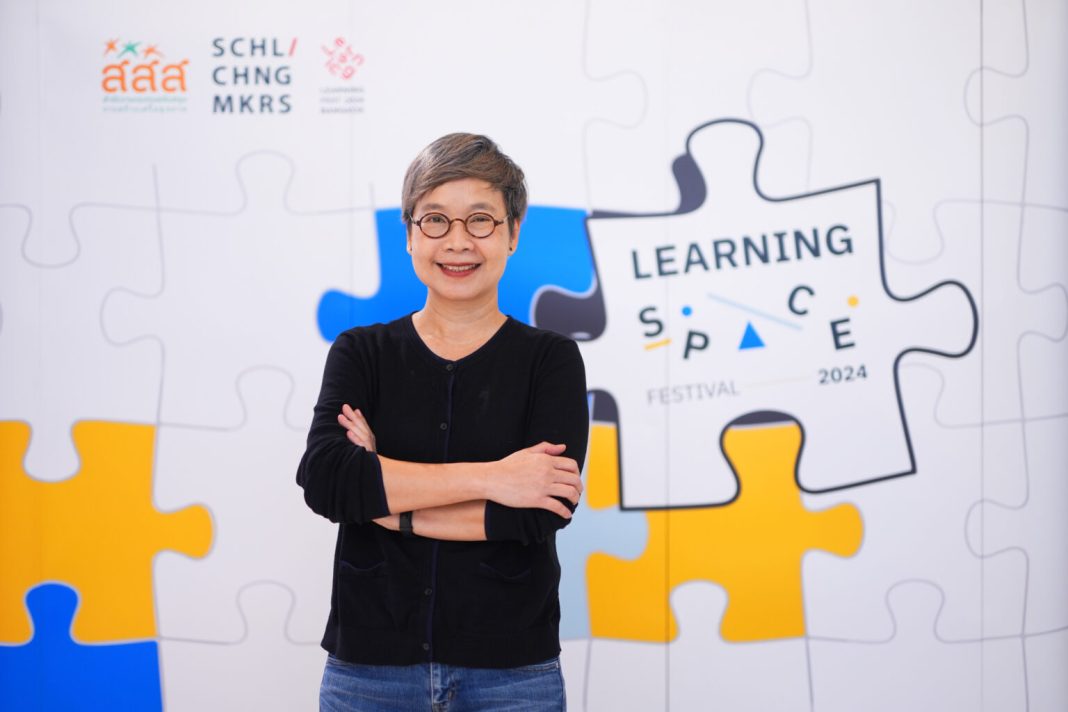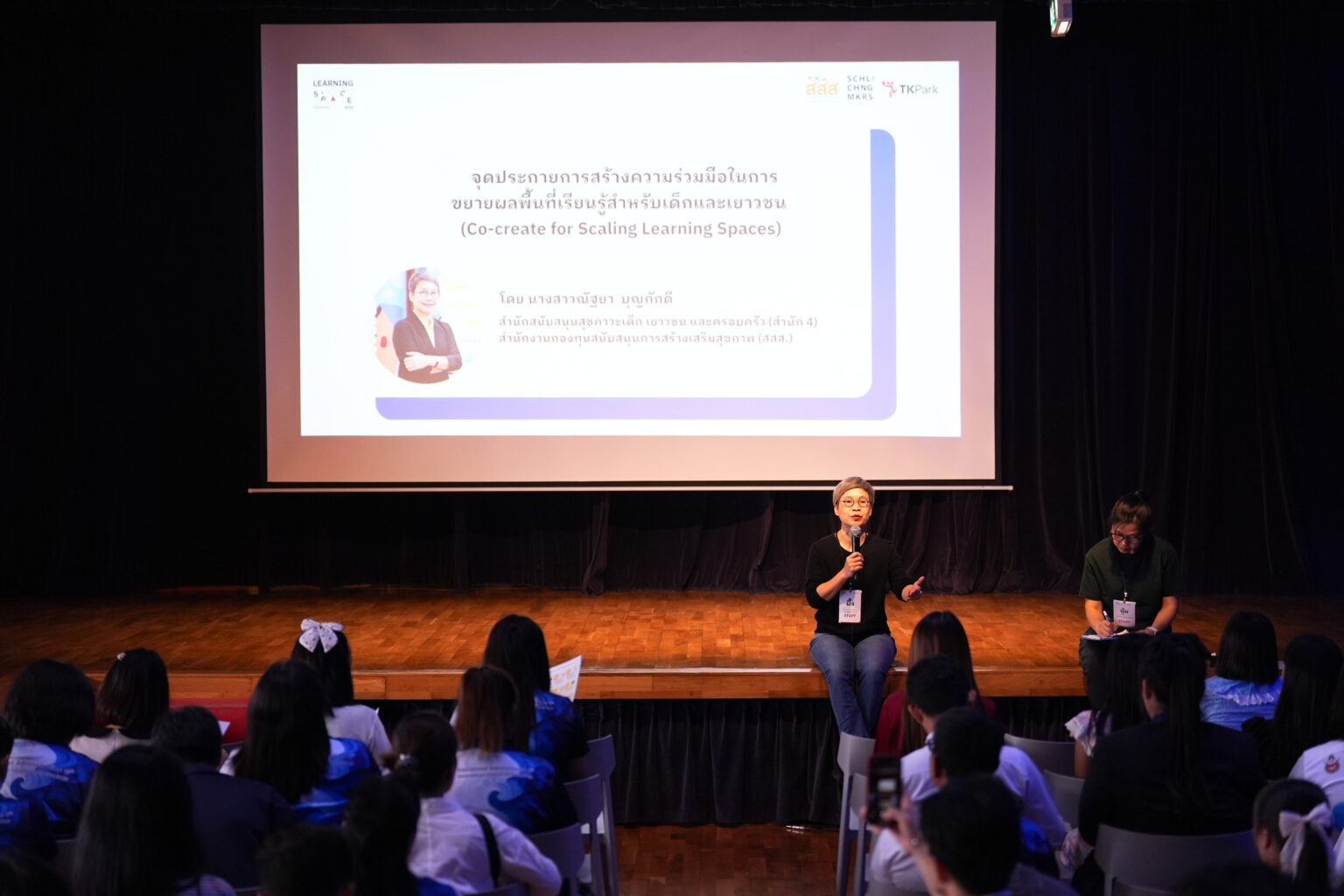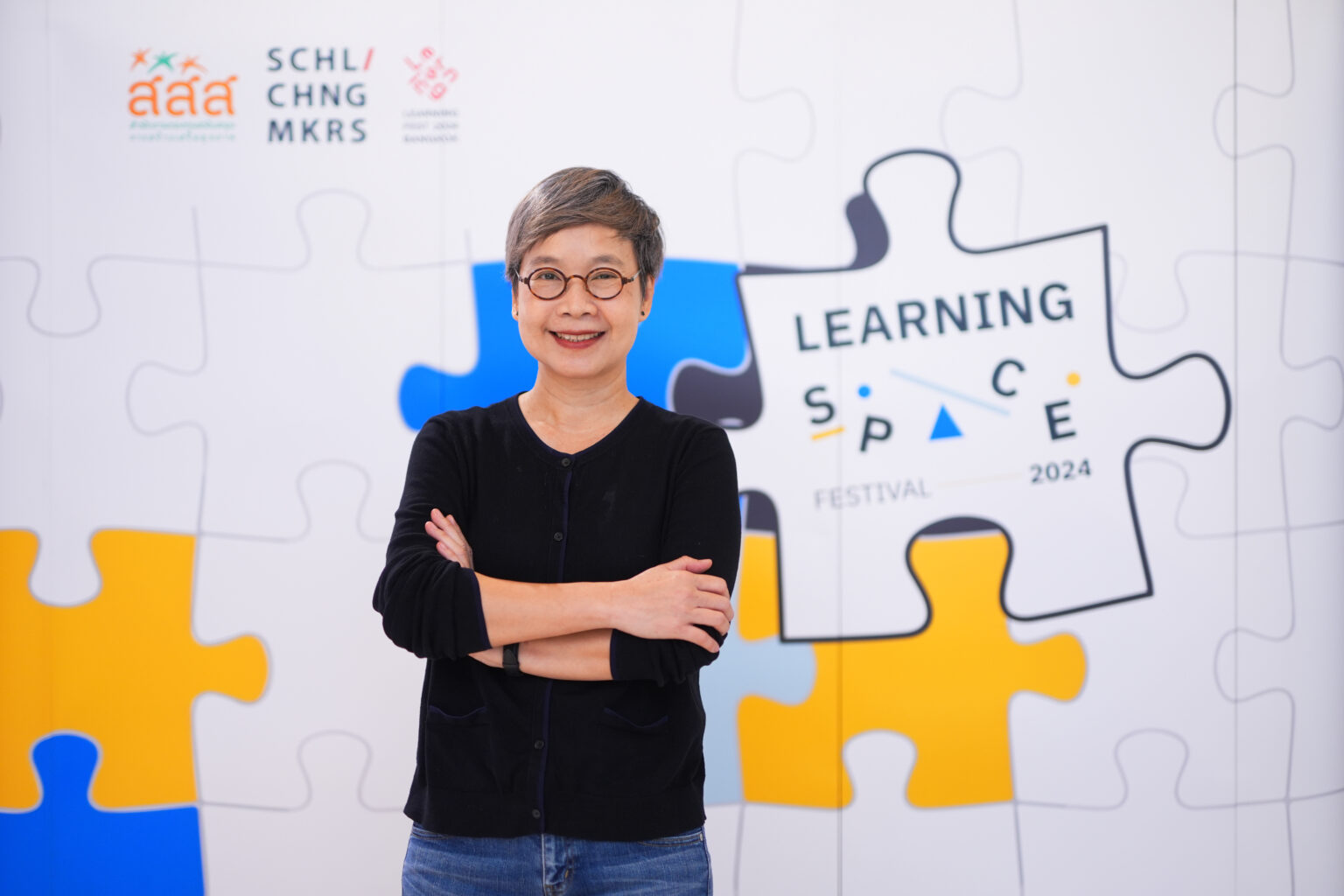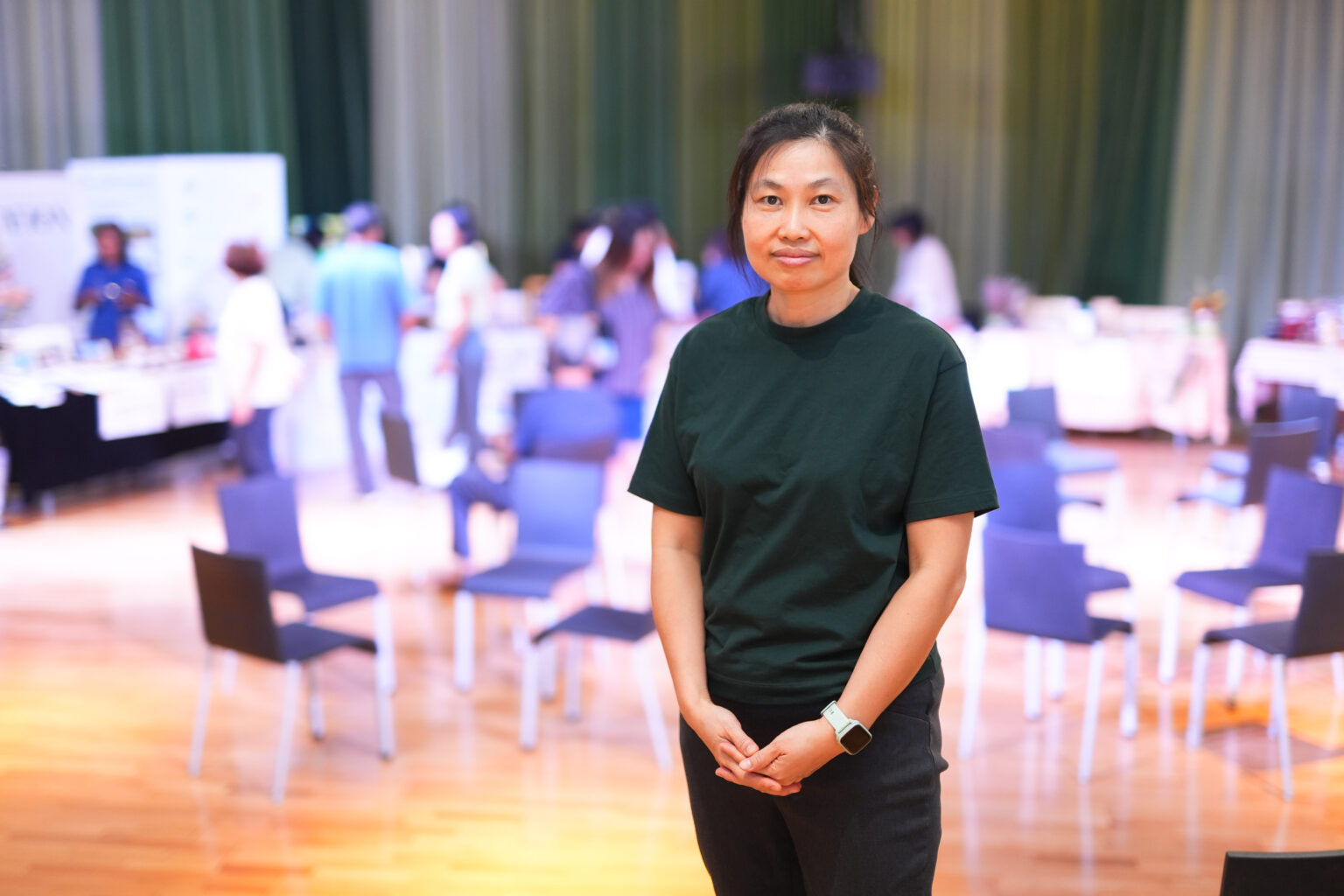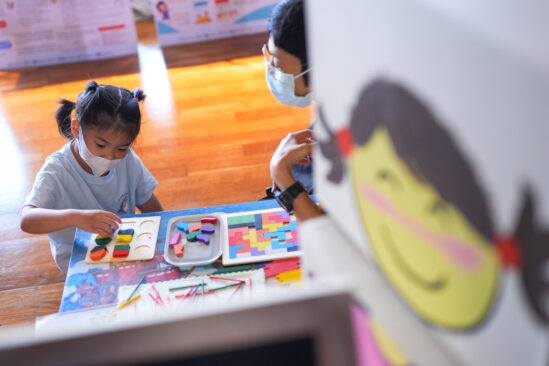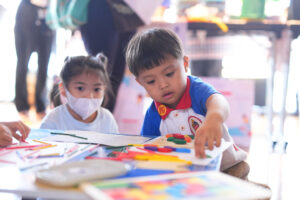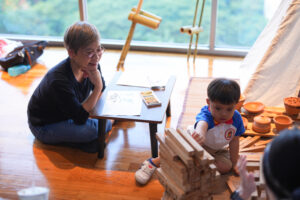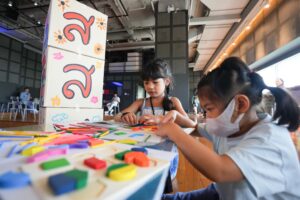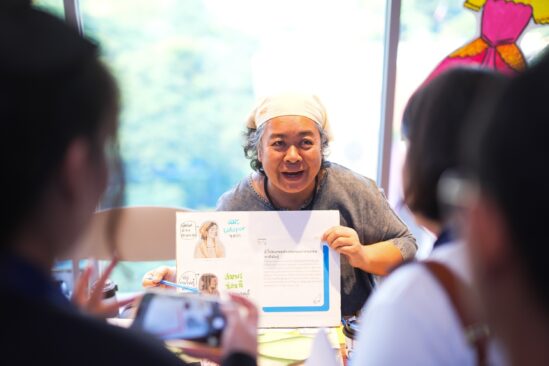สสส. เผยเด็กไทยเกิดใหม่ลดลง 50% จากเดิม 1 ล้านคน พบ พัฒนาการด้านการใช้ภาษาล่าช้า 74.8% เข้าใจภาษา 60.9% ชวนรัฐ-เอกชน ลุยสร้างพื้นที่เรียนรู้ 15 นาที ใกล้บ้าน ช่วยเด็กมีพัฒนาการดี เติบโตอย่างมีคุณภาพ
วานนี้ (17 พ.ย. 2567) ที่อุทยานการเรียนรู้ TK Park ศูนย์การค้าเซ็นทรัลเวิลด์ กรุงเทพฯ สำนักงานกองทุนสนับสนุนการสร้างเสริมสุขภาพ (สสส.) ร่วมกับเครือข่ายศูนย์บ่มเพาะพื้นที่เรียนรู้ จัดงาน Learning Space Festival ครั้งที่ 2 เพื่อเปิดโอกาสให้หน่วยงานส่งเสริมพื้นที่เรียนรู้ องค์กรภาคธุรกิจ ภาครัฐ ผู้ที่ทำงานในประเด็นเรียนรู้และการศึกษาสำหรับเด็กและเยาวชน ได้มีโอกาสร่วมกันสนับสนุนการทำงาน และส่งเสริมให้เกิดการขยายผลของพื้นที่เรียนรู้เพิ่มขึ้น
ณัฐยา บุญภักดี ผู้อำนวยการสำนักอาวุโส สำนักสนับสนุนสุขภาวะเด็ก เยาวชน และครอบครัว สสส. กล่าวว่า ปัจจุบันอัตราเด็กเกิดใหม่ของไทยลดลง ร้อยละ 50 จาก 37 ปีที่แล้ว และมีแนวโน้มลดลงอย่างต่อเนื่อง เด็กไทยส่วนใหญ่อยู่ในครอบครัวที่ยากจน จากรายงานสถานการณ์เด็กและครอบครัว ปี 2567 ที่จัดทำโดย สสส. และศูนย์ความรู้นโยบายเด็กและครอบครัว พบว่า เด็กและเยาวชน 7.8 ล้านคน อาศัยอยู่กับครอบครัวในภาคเกษตรที่มีรายได้ไม่แน่นอน และไม่ถึง 3,000 บาทต่อเดือน ซึ่งต่ำกว่าเส้นความยากจน กระทบต่อการศึกษาและพัฒนาการของเด็ก
ณัฐยา กล่าวว่า จากข้อมูลข้างต้น สอดคล้องกับผลการติดตามข้อมูลพัฒนาการเด็กปฐมวัย ปี 2566 โดย กรมอนามัย กระทรวงสาธารณสุข พบ เด็กปฐมวัยมีพัฒนาการล่าช้าด้านการใช้ภาษาสูงถึงร้อยละ 74.8 การเข้าใจภาษา ร้อยละ 60.9 ด้านกล้ามเนื้อมัดเล็กและสติปัญญา ร้อยละ 44.6 และด้านการเคลื่อนไหว ร้อยละ 28.2 สสส. จึงร่วมกับภาคีเพื่อให้เกิดพื้นที่เรียนรู้ในชุมชน ใกล้บ้าน ช่วยให้ครอบครัวได้ใช้เวลาร่วมกับเด็ก สร้างโอกาสในการพัฒนาทักษะที่จำเป็นสำหรับการศึกษา การใช้ชีวิต และการทำงาน
“สสส. ขับเคลื่อนงานสร้างสุขภาวะและคุณภาพชีวิตเด็กและเยาวชน ผ่านแผนงานส่งเสริมพื้นที่เรียนรู้เพื่อความสุขของเด็ก มีภาคีร่วมดำเนินงาน 94 แห่ง กระจายตัวอยู่ใน 29 จังหวัดทั่วประเทศ เกิดเป็นโมเดลที่หลากหลายในการสร้างพื้นที่เรียนรู้ และยังร่วมกับภาคีเครือข่ายศูนย์บ่มเพาะพื้นที่เรียนรู้ จัดงาน Learning Space Festival เพื่อเปิดโอกาสให้ภาคธุรกิจ ภาครัฐ ผู้ที่ทำงานในประเด็นการศึกษาและปัญหาเด็ก ได้พบปะเพื่อสร้างร่วมมือกันการทำงานให้เกิดการขยายผลของพื้นที่เรียนรู้ผ่าน 3 แนวทาง คือ ร่วมเป็นส่วนหนึ่งในการแก้ไขปัญหา (Contribute) สานความสัมพันธ์ พร้อมเชื่อมโยงการทำงาน (Connect) และ สร้างความร่วมมือและระดมทรัพยากรเพื่อตอบโจทย์ความยั่งยืน (Collaborate)”
ณัฐยา บุญภักดี
พรจรรย์ ไกรวัตนุสสรณ์ ผู้ก่อตั้ง School of Changemakers กล่าวว่า ปัจจุบันเด็กและเยาวชนเผชิญกับปัญหาพัฒนาการล่าช้า ติดจอ สุขภาพจิตเสีย เสี่ยงหลุดจากระบบการศึกษา ขาดโอกาสในการพัฒนาทักษะที่จำเป็นสำหรับอนาคต เช่น ทักษะการสื่อสาร ความคิดสร้างสรรค์ การคิดวิเคราะห์ และการแก้ไขปัญหา สาเหตุจากผู้ปกครองเด็กส่วนใหญ่ต้องทำงานหนัก ไม่มีเวลาเอาใจใส่ เด็กต้องอยู่บ้านเพียงลำพัง หรืออยู่กับผู้สูงอายุ และไม่มีเครื่องมือสำหรับใช้ดูแลพัฒนาการเด็ก สอดคล้องกับผลการสำรวจสถานการณ์เด็กและสตรีในประเทศไทย ปี 2565 โดยสำนักงานสถิติแห่งชาติ องค์การยูนิเซฟ ประเทศไทย สำนักงานพัฒนานโยบายสุขภาพระหว่างประเทศ และกรมอนามัย พบว่า เด็กปฐมวัย ร้อยละ 64 มีการใช้งานอุปกรณ์อิเล็กทรอนิกส์ เช่น โทรศัพท์มือถือ แท็บเล็ต โดยมีระยะเวลาการใช้จอที่มากกว่า 1 ชั่วโมงต่อวัน ส่งผลต่อชั่วโมงการเล่นของเด็กปฐมวัยที่ลดลงถึงร้อยละ 50 ปัญหาด้านพัฒนาการของเด็กและเยาวชนจึงเป็นปัญหาใหญ่ของสังคมลำดับต้น ๆ ที่ทุกภาคส่วนต้องร่วมมือกันแก้ไขอย่างเร่งด่วน เพื่อสร้างแรงงานและประชากรที่มีคุณภาพสำหรับประเทศในอนาคต
โดยภายในงาน Learning Space Festival แบ่งพื้นที่ออกเป็น 3 โซน ได้แก่
- โซน Connect มีภาคีศูนย์บ่มเพาะพื้นที่เรียนรู้กว่า 20 แห่ง ร่วมจัดแสดงโมเดลพื้นที่เรียนรู้เด็กและเยาวชนในชุมชน พร้อมโชว์ผลิตภัณฑ์ เครื่องมือ และหลักสูตรที่ส่งเสริมการเรียนรู้ด้านสังคมและจิตใจ ช่วยให้เด็กมีพัฒนาการสมวัย เพิ่มชั่วโมงเล่น ลดชั่วโมงติดจอ
- โซน Contribute เปิดรับองค์กรภาครัฐ ธุรกิจ และผู้ที่สนใจร่วมเป็นส่วนหนึ่งในการส่งเสริมการเรียนรู้และพัฒนาเด็กเยาวชนตามความสนใจ
- โซน Collaborate เปิดโอกาสให้เครือข่ายพื้นที่เรียนรู้ที่มีโมเดลการขยายผลพื้นที่เรียนรู้ในรูปแบบโปรแกรมบ่มเพาะ (Incubator) สร้างความร่วมมือกับภาคธุรกิจหรือภาครัฐที่กำลังมองหาประเด็นและเป็นหุ้นส่วนในการทำงานที่ส่งเสริมการเรียนรู้และพัฒนาเด็กเยาวชนในวงกว้างเพื่อตอบโจทย์ความยั่งยืน
Nguồn: Thai PBS; https://theactive.thaipbs.or.th/news/learning-education-20241117

